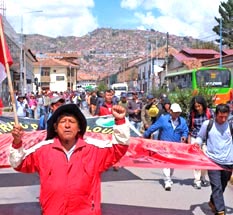
January 24— “We have criminal ministers, murderous presidents, and we live like animals in the midst of so much abundance that they steal every day,” said a farmer organizer from the Cusco area of Peru.
On December 7, the liberal former president Pedro Castillo, the Agrarian and Rural Front, and the National Assembly of the People organized a march that they called “Take Over Lima.” They demanded the closure of congress and support for the president’s call for a new constitution.
The most right-wing opposition, which controls the Constitutional Court, declared the president’s demand null and void. The armed forces supported the court, removing and arresting him. Vice President Dina Boluarte was appointed the new president.
It is a furious struggle between bosses for state power. That means control of natural resources and of the working masses for some bosses’ benefit. In the last six years, five presidents have passed through power.
The massive workers’ demonstrations are struggling to defend themselves from the constant aggression of the exploiting class in power. It is a fight against the racism and exploitation that the government and big business promote every day to keep millions of farmworkers, miners, and urban workers in misery.
Thousands of farmworkers, including many indigenous people, recently arrived in Lima to protest government repression, including the murder of over sixty protesters. Thousands of workers and students joined massive and violent protests against the police and the government.
Indigenous communities in Peru have a long history of leading struggles on the streets and in the mines. These working masses inspire other workers to fight against the oppressing class. They have closed airports, blocked main roads, burned down police posts, and violently confronted the police in the streets.
The working masses are fed up with the racism and misery to which the bosses have subjected them for centuries. But for a real change, they need the communist ideas of the International Communist Workers’ Party. No more boss politicians who promise to improve capitalism! We need a communist society based on meeting the needs of the working class, not the pockets of the bosses.
US and Chinese Imperialists Are In This Bosses’ Fight
Behind every government in the world there is an imperialist with the military and economic power to impose a president and government that works for their benefit. Although Castillo appeared to represent the poor, farmworkers and indigenous people, the power structure is already organized to benefit the bosses.
Of the 500 largest companies in Peru, two dozen are dedicated to extracting oil and gas. Approximately 48 are dedicated to mining. Here, as elsewhere in the world, there are energy resources that both competitors can extract to power their factories and weapons. There are close to 200 Chinese capitalist enterprises in Peru, including mining companies such as Shougang, Chinalco and Las Bambas. Peru is China’s largest supplier of copper.
On June 10, 2022, then-President Pedro Castillo participated in the IX Summit of the Americas, in Los Angeles, USA. Another Peruvian representative said that more U.S. companies were willing to work there. The US ambassador to Peru, Lisa Kenna, has been a CIA agent and worked for the Pentagon. Kenna met with the Peruvian defense minister one day before Castillo’s coup and arrest.
Workers have nothing to gain from this fight between local bosses and imperialists. But their massive demonstrations have the potential to make them the gravediggers of all exploiters and builders of a new communist world.
Only in communism will the masses have control of our lives and produce what we need, since there will be no wage slavery, nor the money that gives banks and businessmen the power to destroy the lives of millions of workers.
We must look for ways to bring our communist ideas to the Peruvian masses. Any comrade or friend can help contact people and send them Red Flag or put them in contact with us.


